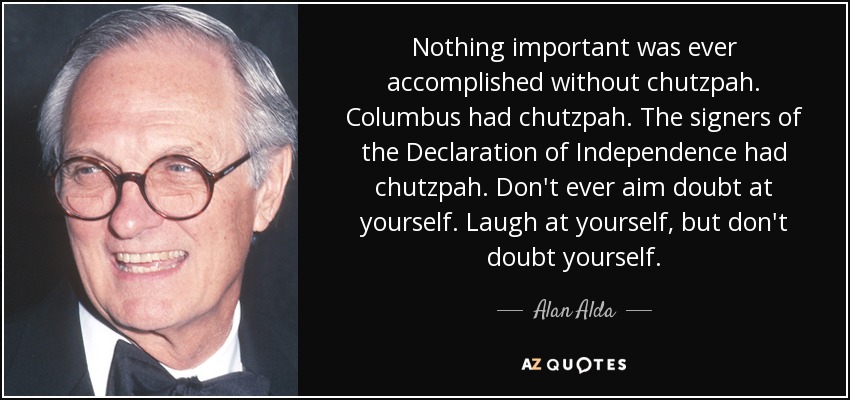I’m thinking I sure do!
Chutzpah is that zingy Hebrew word that means gall, effrontery and sometimes outrageous audacity. It’s the stuff that entrepreneurs, politicians and every-day go-getters have loads of.
What does it look like? How about not taking no for an answer, daring to ask why when everyone else is frozen in stunned silence or anxious passivity, or thinking ‘what the hell, why not?’ and jumping into a situation without any guarantee of the results – but being without-a-shadow-of-a-doubt sure of what you’re aiming for.
Chutzpah is just one of the concepts illustrated in the numerous stories of entrepreneurial success described in the book Start-Up Nation: The Story of Israel’s Economic Miracle, by Dan Senor and Saul Singer (M&S, 2009). The tour guide on my recent trip to Israel and Jordan highly recommended it as a resource for getting a better grasp of the innovative Israeli mindset and culture.
He was so right. Not only is it enlightening, but it is inspiring. Wix, Waze, Teva… these are just three examples of Israeli start-ups. When considering the fact that Israel boasts the highest per-capita density of start-ups in the world, you can’t but help be intrigued by the success of this New-Jersey sized newborn state.
So how does chutzpah play out? What can a language teacher or student learn from it?
#1. Chutzpah means asking questions.
Senor and Singer explain that Israelis learn from the get-go that ‘assertiveness is the norm, reticence something that risks your being left behind’ (p. 31). This means that whether it be at home, school, in business or the army, they are taught to ask questions.
To me, the practical application is a gentle reminder to forget being shy and speak up when a question is warranted. What do you want? What do you need to know? Ask. Don’t be shy!
#2. Chutzpah means taking the initiative.
Soldiers in the Israeli military are trained to act with the understanding that all performance is value-neutral, meaning that whether positive or negative outcomes are treated equally. The priority is to learn from the ‘errors’ and to take risks intelligently.
So, speaking up in class, possibly making all kinds of syntactic errors is no big deal. What can you learn from it? Or, as a teacher – or writer, trying out a new activity or form of writing and seeing it fall flat, does not mean you are not made to be a teacher or writer, but that you have something to learn. Learn from it and do better next time!
#3. Chutzpah means arguing when necessary.
Four guys are standing on a street corner…
An American, a Russian, A Chinese man, and an Israeli…
A reporter comes up to the group and says to them:
‘Excuse me… What’s your opinion on the meat shortage?’
The American says: What’s a shortage?
The Russian says: What’s meat?
The Chinese man says: What’s an opinion?
The Israeli says: What’s ‘Excuse me’?
- Mike Leigh, Two Thousand Years (p. 23, Senor & Singer)
That Israeli guy had some chutzpah! And you know that a debate probably ensued. That guy was ready to defend his opinion.
Elsewhere, the authors of Start-Up Nation quip that when you have two Israelis, you are most likely to have three opinions! My own personal thought when I was in Israel, upon observing the way questions were asked and debating was welcomed, “It’s no wonder there are so many Jewish lawyers and business-men!”
If you believe in your idea, either as student or teacher, defend it – calmly, logically and creatively. The entire class will benefit from the discussion!
Final Shot
I’ll leave the final thought with Alan Alda.

Shabbat Shalom! Have a great weekend! – Claire


